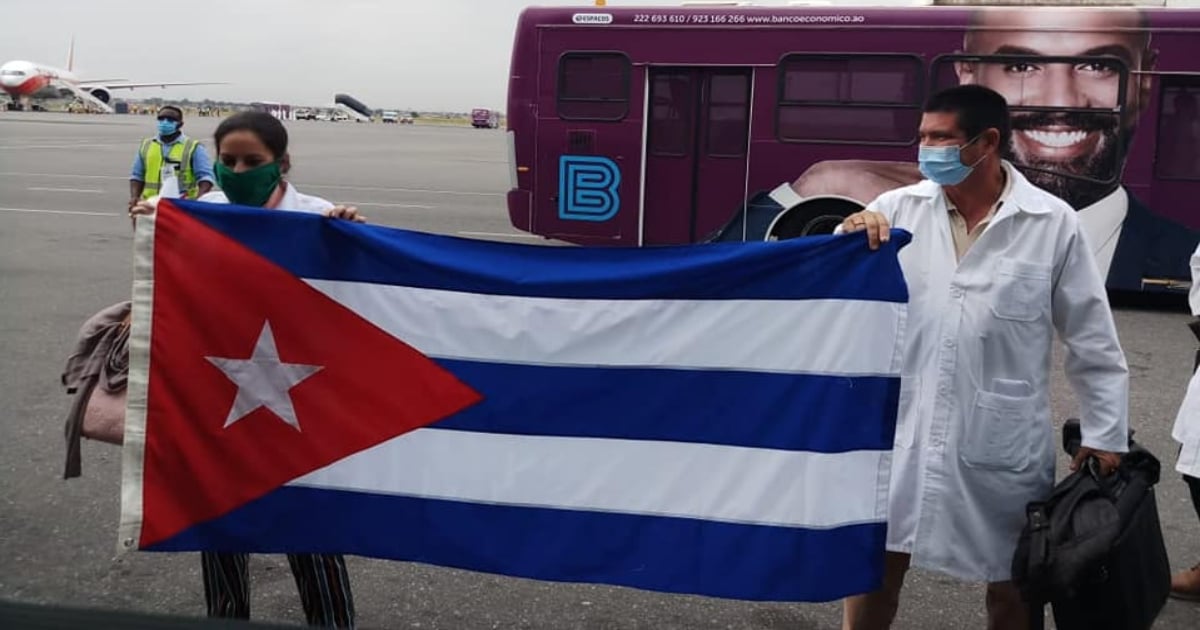
A couple of Cuban doctors who completed an "internationalist mission" in Angola reported that, since their return to Cuba almost a year ago, the Banco Popular de Ahorro (BPA) owes them the dollar earnings they are entitled to for the work done in the African country, one of many to which the regime exports professionals, mostly from the health sector.
Doctors Eliannys Saborit Oliva, an anesthesiologist, and her husband Alfredo Miguel Ramos, an orthopedic surgeon, who reside in the city of Bayamo in Granma and work at the Carlos Manuel de Céspedes hospital, were part of the Cuban medical brigade in Angola for three years, from which they returned in October 2023.
In a letter sent to the official newspaper Juventud Rebelde, published in the "Acknowledgment of Receipt" section of the September 14 edition, they denounced the arbitrariness of the BPA and banking and government authorities in the country regarding the payment of the majority of the income they earned from their work, which has not been allowed to be withdrawn from their accounts for almost a year, because there is "no availability" of foreign currency, and they are also unable to collect it at a branch in another province that has the money.
In a brief presentation of the case, Juventud Rebelde noted that upon the doctors' return to Cuba in October 2023, "after bringing foreign currency into the country with their specialized service, the payment they are owed has been exercised minimally" and added: "The obligation to pay them the full amount of the foreign currency they are entitled to within a reasonable period has not been fulfilled, specifically, by the Banco Popular de Ahorro."
According to the letter from the doctors, which is quoted verbatim by the newspaper, “this situation, they assert, is more critical in the province of Granma, and due to banking policy, they do not allow us to make the currency request in another province with greater availability because we do not reside there.” They revealed that, however, colleagues from other provinces who also completed the so-called “medical mission” “have already had their requests settled.”
Saborit and Ramos questioned that the bank also does not outline "strategies for sending monetary reinforcement, after almost a year of waiting to withdraw the cash in foreign currency that corresponds to us for having brought money into the country," and claimed that they were in Angola "also representing our nation with dignity, saving lives surgically, under adverse conditions of tuberculosis, hepatitis, HIV, malaria, Covid-19, at the sacrifice of leaving behind a daughter and the rest of the family."
After having processed several complaints "at the central banking level," the doctors complained that they continue "without the requested money (...), without a delivery date, and without the possibility of buying a home and becoming independent in living."
The couple has made three trips to Havana and submitted letters to the Council of Ministers, but the governmental body "transferred the matter to the Central Bank of Cuba, which states the same response: there is no availability," the letter specifies.
"The low availability is real," the doctors conclude in their complaint, "but it is not understandable for us that after almost a year, we still do not have the demand resolved."
The Cuban government keeps between 75% and 90% of the high salaries paid by the countries with which the regime contracts the export of health services for Cuban doctors.
Part of the salary of professionals is deposited into accounts in banks in Cuba, an amount that they are supposedly able to withdraw without any issues when they return to the country. However, the case of the doctors from Granma calls that possibility into question.
The export of Cuban professionals to other countries reported $4,882,234,500 to the regime in 2022, according to figures from the Statistical Yearbook of Cuba for that year, published by the National Office of Statistics and Information (ONEI).
For years, the Cuban regime has been internationally accused of promoting a "system of modern slavery" due to the treatment of members of the medical brigades who carry out "internationalist missions" in other countries.
The United Nations (UN) Special Rapporteur on contemporary forms of slavery, Tomoya Obokata, reiterated in January his call to the Cuban State to respond to the serious allegations of alleged human rights abuses suffered by Cuban professionals on international missions.
In the last year, Cuban banks and financial entities have used the lack of cash as an excuse to deny money to customers who need to make withdrawals or transfers.
Last week, a Cuban named Irán Morejón Quintana reported on social media that the Banco Metropolitano refused to refund him a deposit of 3,130 euros that he made in that institution, arguing that they did not have cash available to make the refund. The young man complained to the Central Bank of Cuba and at the customer service office of the Council of State, which have also done nothing to return his savings.
In January 2021, as part of the misguided "Ordering Task," the government converted the savings in CUC of entrepreneurs, farmers, private sector workers, and also those of doctors and professionals on "mission" abroad into Cuban pesos.
Those affected by the measure woke up on January 1 of that year with the balance of their bank accounts automatically converted to CUP. Both the private sector and the "collaborators" as well as those receiving incentives on magnetic cards were excluded from the possibility of exchanging their money over the next six months, which was the period applicable to the rest of the savers.
What do you think?
COMMENTFiled under:
